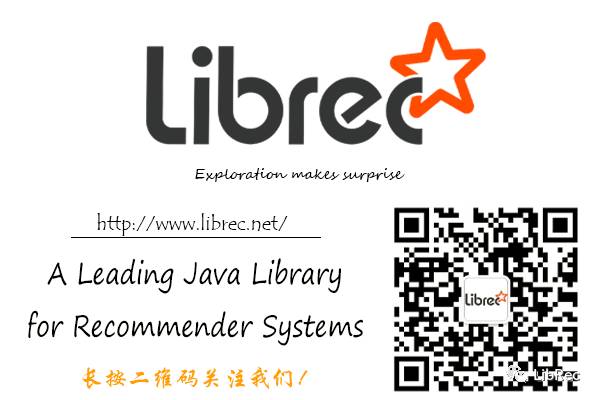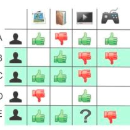LibRec 精选:论文进展(1)
本周更新10篇推荐系统方面的论文,做研究的同学们关注起来。注意:因长度原因,文章摘要可能有所删减。
1. Neural Tensor Factorization
Xian Wu, Baoxu Shi, Yuxiao Dong, Chao Huang, Nitesh Chawla
arXiv:1802.04416v1
Neural collaborative filtering (NCF) and recurrent recommender systems (RRN) are limited in their assumption of static or sequential modeling of relational data as they do not account for evolving users' preference over time as well as changes in the underlying factors that drive the change in user-item relationship over time. We address these limitations by proposing a Neural Tensor Factorization (NTF) model for predictive tasks on dynamic relational data. The NTF model generalizes conventional tensor factorization from two perspectives......
2. Value-Aware Item Weighting for Long-Tail Recommendation
Himan Abdollahpouri, Robin Burke, Bamshad Mobasher
arXiv:1802.05382v1
Many recommender systems suffer from the popularity bias problem: popular items are being recommended frequently while less popular, niche products, are recommended rarely if not at all. However, those ignored products are exactly the products that businesses need to find customers for and their recommendations would be more beneficial. In this paper, we examine an item weighting approach to improve long-tail recommendation. Our approach works as a simple yet powerful add-on to existing recommendation algorithms for making a tunable trade-off between accuracy and long-tail coverage.
3. Recommendations with Negative Feedback via Pairwise Deep Reinforcement Learning
Xiangyu Zhao, Liang Zhang, Zhuoye Ding, Long Xia, Jiliang Tang, Dawei Yin
arXiv:1802.06501v1
The vast majority of traditional recommender systems consider the recommendation procedure as a static process and make recommendations following a fixed strategy. In this paper, we propose a novel recommender system with the capability of continuously improving its strategies during the interactions with users. We model the sequential interactions between users and a recommender system as a Markov Decision Process (MDP) and leverage Reinforcement Learning (RL) to automatically learn the optimal strategies via recommending trial-and-error items and receiving reinforcements of these items from users' feedback......
4. CryptoRec: Secure Recommendations as a Service
Jun Wang, Afonso Arriaga, Qiang Tang, Peter Y. A. Ryan
arXiv:1802.02432v1
Recommender systems rely on large datasets of historical data and entail serious privacy risks. A server offering recommendations as a service to a client might leak more information than necessary regarding its recommendation model and training dataset. At the same time, the disclosure of the client's preferences to the server is also a matter of concern. Providing recommendations while preserving privacy in both senses is a difficult task, which often comes into conflict with the utility of the system in terms of its recommendation-accuracy and efficiency. We precisely define the above notion of security and propose CryptoRec, a novel recommendations-as-a-service protocol, which encompasses a crypto-friendly recommender system......
5. A Study of Position Bias in Digital Library Recommender Systems
Andrew Collins, Dominika Tkaczyk, Akiko Aizawa, Joeran Beel
arXiv:1802.06565v1
"Position bias" describes the tendency of users to interact with items on top of a list with higher probability than with items at a lower position in the list, regardless of the items' actual relevance. In the domain of recommender systems, particularly recommender systems in digital libraries, position bias has received little attention. We conduct a study in a real-world recommender system that delivered ten million related-article recommendations to the users of the digital library Sowiport, and the reference manager JabRef......
6. Variational Autoencoders for Collaborative Filtering
Dawen Liang, Rahul G. Krishnan, Matthew D. Hoffman, Tony Jebara
arXiv:1802.05814v1
We extend variational autoencoders (VAEs) to collaborative filtering for implicit feedback. This non-linear probabilistic model enables us to go beyond the limited modeling capacity of linear factor models which still largely dominate collaborative filtering research.We introduce a generative model with multinomial likelihood and use Bayesian inference for parameter estimation. We introduce a different regularization parameter for the learning objective, which proves to be crucial for achieving competitive performance.......
7. CAPS: Context Aware Personalized POI Sequence Recommender System
Ramesh Baral, Tao Li, XiaoLong Zhu
arXiv:1803.01245v1
Though many POI recommenders have been defined, most of them have focused on recommending a single location or an arbitrary list that is not contextually coherent. It has been cumbersome to rely on such systems when one needs a contextually coherent list of locations, that can be used for various day-to-day activities, for e.g., itinerary planning. This paper proposes a model termed as CAPS (Context-Aware Personalized POI Sequence Recommender System) that generates contextually coherent POI sequences relevant to user preferences. CAPS extends RNN by incorporating multiple contexts to the hidden layer and by incorporating global context (sequence features) to the hidden layers and the output layer......
8. Collaborative Metric Learning Recommendation System: Application to Theatrical Movie Releases
Miguel Campo, JJ Espinoza, Julie Rieger, Abhinav Taliyan
arXiv:1803.00202v1
Collaborative Filtering (CF) models do not perform well in cold start situations like new product launches, and situations with markedly different customer tiers (e.g., high frequency customers vs. casual customers). Learning to measure the distance between points in this space can be accomplished with a deep neural network that trains on customer histories and on dense vectorizations of product descriptions. We developed a system based on Collaborative (Deep) Metric Learning (CML) to predict the purchase probabilities of new theatrical releases......
9. A Generic Top-N Recommendation Framework For Trading-off Accuracy, Novelty, and Coverage
Zainab Zolaktaf, Reza Babanezhad, Rachel Pottinger
arXiv:1803.00146v1
Standard collaborative filtering approaches for top-N recommendation are biased toward popular items. As a result, they recommend items that users are likely aware of and under-represent long-tail items. This is inadequate, both for consumers who prefer novel items and because concentrating on popular items poorly covers the item space, whereas high item space coverage increases providers' revenue. We present an approach that relies on historical rating data to learn user long-tail novelty preferences. We integrate these preferences into a generic re-ranking framework that customizes balance between accuracy and coverage......
10. Cross-Domain Recommendation for Cold-Start Users via Neighborhood Based Feature Mapping
Xinghua Wang, Zhaohui Peng, Senzhang Wang, Philip S. Yu, Wenjing Fu, Xiaoguang Hong
arXiv:1803.01617v1
In this paper, we propose a Cross-Domain Latent Feature Mapping (CDLFM) model for cold-start users in the target domain. Firstly, in order to better characterize users in sparse domains, we take the users' similarity relationship on rating behaviors into consideration and propose the Matrix Factorization by incorporating User Similarities (MFUS) in which three similarity measures are proposed. Next, to perform knowledge transfer across domains, we propose a neighborhood based gradient boosting trees method to learn the cross-domain user latent feature mapping function. For each cold-start user, we learn his/her feature mapping function based on the latent feature pairs of those linked users who have similar rating behaviors with the cold-start user in the auxiliary domain. And the preference of the cold-start user in the target domain can be predicted based on the mapping function and his/her latent features in the auxiliary domain......





